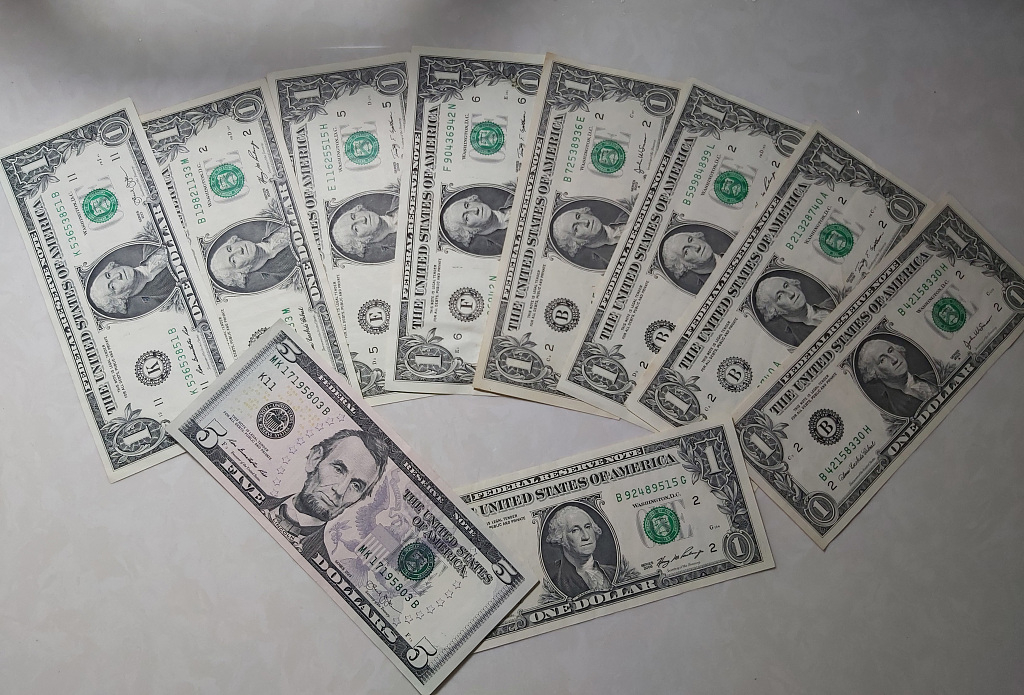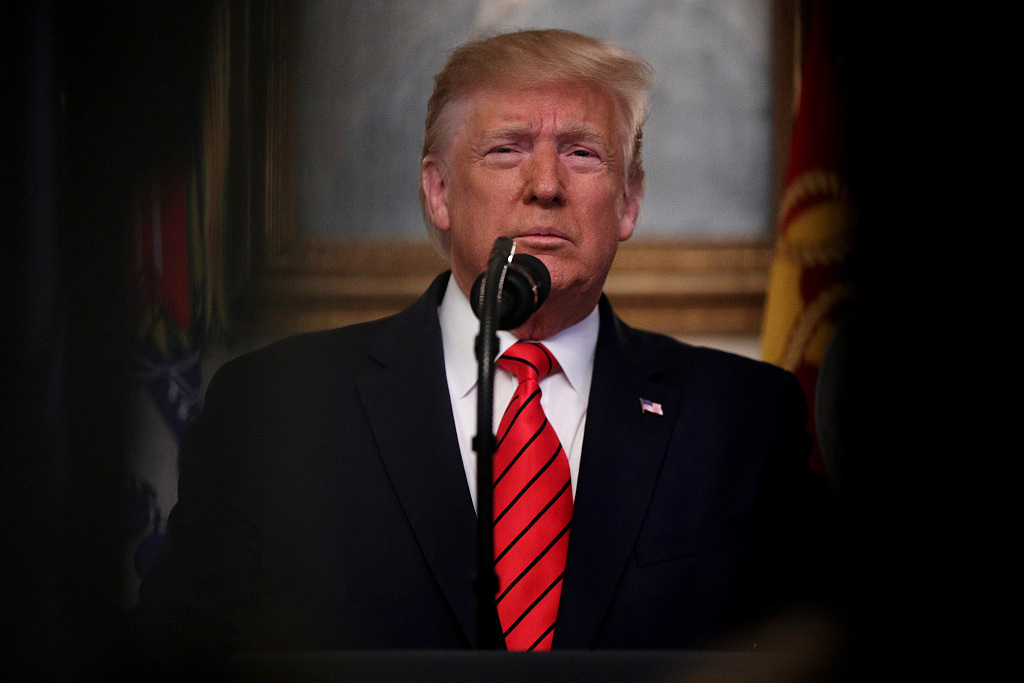Editor's note: Huang Yongfu is a senior fellow at the International Cooperation Center of the National Development and Reform Commission of the People's Republic of China. The article reflects the author's opinions, and not necessarily the views of NDRC and CGTN.
In late October, the Fed cut its benchmark lending rate for the third time this year, lowering its target range on overnight interest rates by a quarter-point.
The cut was said to cushion the economy against the risk of a downturn brought on by sagging business investment, slowing global growth and trade uncertainty.
However, the Trump administration's security-driven politics and sanction-happy policies would upset the Fed by blunting the effectiveness of its easing policy and investors and analysts who have cheerfully anticipated a pause to future cuts.
Trump administration's policies might compromise dollar's centrality
As the world's reserve currency, the U.S. dollar sits at the center of the pre-eminent mechanism for world trade and foreign exchange. Because of its centrality, the dollar acts as a safe haven to which investors tend to flee when they are feeling uncertain, or see the U.S. economy relatively strong and the payout on Treasury bonds standing far above that of other government bonds.
The widespread demand for dollars outside of the U.S. borders tends to cause the dollar to grind higher against the currencies of many of America's trading partners, defying expectations that the Fed rate cut would dent the appeal of U.S. assets to yield-seeking investors.
However, uncertainty is currently driven by the U.S. itself, more specifically by the administration's protectionist, nationalist policies that are causing havoc in the markets.
The U.S. is likely to remain embroiled in the trade dispute with China given its security-driven politics. Although U.S. and Chinese trade negotiators have made headway at phase one, addressing longer-term and more structural complaints in the next phases won't be easy, such as removing sanctions over China's tech giants Huawei, turning over crucial technology in exchange for access to China's market.

The U.S. dollars. /VCG Photo
The U.S. dollars. /VCG Photo
In addition, President Trump is under an impeachment inquiry and facing the looming 2020 election, which already looks as bitter as 2016.
Those U.S.-centric issues accompanied by overwhelming uncertainty and overwrought recession fears are enough to convince investors that overseas markets are actually more certain bets than U.S. markets. Investors are driven to havens, not the dollar, and prepared for a colossal migration of capital in search of certainty in overseas markets.
This is also motivated by the fact that foreign currencies will be boosted with growth accelerating abroad as central banks outside the U.S. raise rates.
U.S. consumers, firms pay for the consequences
The weaker dollar, or not as strong as expected, will give U.S. companies and consumers fits by hurting straightaway those who need to buy goods from abroad. American tourists will see their wallets go flatter when they travel.
The weaker dollar might please President Trump, who has constantly complained the dollar's strength curbs growth. A weaker dollar is supposed to benefit U.S. exporters because it makes their products more competitive abroad.
However, the Trump administration's seismic decision to enforce separation between two world's economic and technological superpowers is throwing cold water on that, as China is a huge market.
Although Vice President Mike Pence has recently denied the Trump administration's intention to decouple the China-U.S. economic relationship explicitly, the U.S. government has not yet lifted its blacklist that bars Chinese firms from doing business with American companies without official permission.
In the latest development, the U.S. Federal Communications Commission announced on October 28 that it will place further restrictions on Huawei within the U.S. market and remove government subsidies for small and rural U.S. providers who purchase equipment or services from Huawei.

U.S. President Donald Trump makes a statement in the Diplomatic Reception Room of the White House in Washington, October 27, 2019. /VCG Photo
U.S. President Donald Trump makes a statement in the Diplomatic Reception Room of the White House in Washington, October 27, 2019. /VCG Photo
The damage of the Trump administration's policies is seen through U.S. economic data for the third quarter, for example, with declines in net exports (minus 0.08) and gross private investment (minus 0.27) offset by government spending that accounted for 0.35 point of the 1.9 percent growth.
The S&P 500 companies with more international exposure reported falling earnings compared with a year earlier.
According to the latest version of ADP National Employment Report, the nonfarm private sector in the U.S. added 125,000 jobs in October 2019, a substantial drop from 227,000 jobs from the same period last year.
Opportunities open up for emerging markets
The Fed rate cut gives emerging economies a welcome silver lining or creates a benign opportunity for them to ease their own interest rates to exploit catch-up growth.
Following the Fed, a wider move of rate cuts around the developing world has been underway, with central banks in Brazil, Kuwait and the United Arab Emirates among those acting.
To hedge uncertainty in the U.S. markets, investors are heading to emerging markets, contributing to their currency stability and even currency appreciation. A stronger currency makes it easier for developing countries to service their dollar-denominated debt.
Currency appreciation could help curb inflation in emerging economies, where central banks often fight to keep prices from soaring too quickly. Oil, copper and most other raw materials denominated in dollars are likely to become more acceptable for emerging economies when the U.S. currency is not going up, helping choke off inflation.
Emerging economies should take the opportunity to reduce short-term foreign-currency debt, aim to maintain solid balance sheets and ensure their development measures are reinforced by better global policy coordination.
(If you want to contribute and have specific expertise, please contact us at opinions@cgtn.com.)